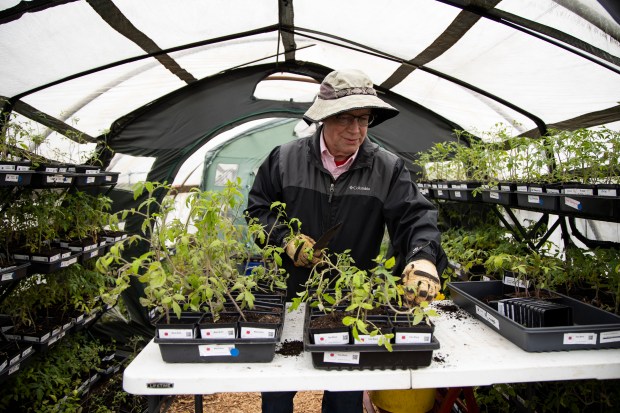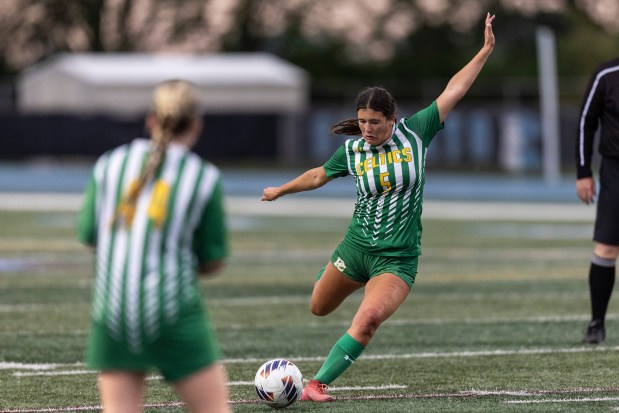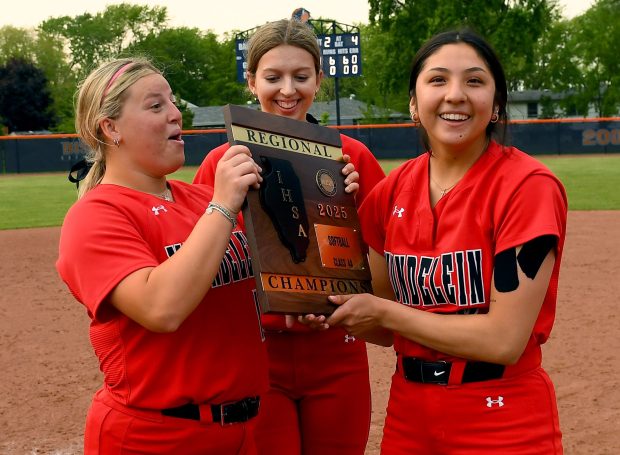Bob Zeni had a plant problem. A few years after deciding to spend late winters learning how to start his own tomato seedlings, the sprouts had taken over his home in La Grange Park.
It was, as he called it, a turning point.
“That was about four years ago, when I had 2,000 plants started,” he recalled. “When they were really small they weren’t a problem. But when I had to up-plant them into 4-inch pots, we had them in every room in the house, next to every window I could find.
“My wife put her foot down and said you can’t do that anymore.”
Zeni began his tomato deep dive several years earlier when seeking a late-winter distraction after years of working at home as a graphic designer.
“It gets cold in the winter and I wouldn’t leave the house for weeks,” he said. “My wife claimed I was getting weird, and she insisted that I get a hobby.”
At the same time he was reflecting on the “tasteless atrocities that pose as tomatoes at supermarkets” during the offseason and decided to do something about it. He set up some tables and lights and planted some seeds.
There were mistakes — “overwatering, under watering, not enough heat,” Zeni said. But along with those setbacks were “small successes that gave me enough hope that I was on the right track.”
After a few seasons, he had enough plants that he would give them to any and all interested neighbors, and his tomato operation in La Grange Park kept growing larger. He began selling seedlings at “garage sales” to help fund his hobby, selling 50 to 75 plants.
“We put signage up when people just started showing up, telling me they’d heard about me from other people,” he said. “I got to 500 plants and sold them out. I’d get emails in January asking when’s the sale? That was the first indication I got that maybe this could be more than just a wintertime hobby.”
He decided to go all-in and started calling himself the Chicago Tomato Man.
“It’s spiraled to the point where this year we’ll grow around 15,000 plants,” he said in April.
He still grows at home, but the bulk of his operation is offsite, using contracters who deliver his plants to a warehouse near Western and Ogden avenues in Chicago, where they’re matched to orders and taken to pop-up markets throughout the city and suburbs.
Some of those seedlings are earmarked for other purposes as well.
“We give away lots of plants,” Zeni said. “We hear about efforts by nonprofit organizations or groups that are running gardens that use their harvest to give away produce to food banks. We totally support those efforts, so we give them plants every year.”
Last year, the Chicago Tomato Man organization gave away nearly 1,500 plants, and they’re looking to equal that this year.
Among the organizations that have worked with Zeni is Eden Greens Urban Farm, which provides healthy food as well as gardening resources for underserved communities such as Pullman, Englewood and Greater Grand Crossing.
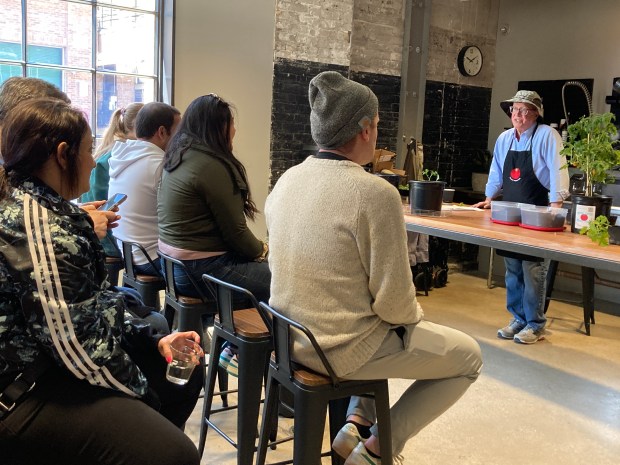
Tomato plants also went to We Grow We Sow, Inc., an urban farm based in West Pullman that offers produce and education to people in Roseland, Morgan Park and Calumet Park.
Seedlings have even gone to the Cook County Juvenile Temporary Detention Center, for its Karma Garden project.
“This is good,” Zeni said. “We want to get these plants to any neighborhood that lacks access to food.”
And they’re not getting run-of-the-mill tomatoes. They’re getting the good ones, the heirlooms, some that have been passed down seed by seed for generations of gardeners.
Among Zeno’s seedlings are varieties such as Rutgers, developed in 1928 by the Campbell Soup Company and released to farmers in 1934 by Rutgers University.
There’s also Mortgage Lifter, a large beefsteak tomato developed, as the story goes, in the 1940s by a gardener in West Virginia who crossed varieties for six years before arriving at one so popular he was able to pay off his $6,000 mortgage by selling plants for $1 each.
There’s several varieties, such as the Sandburg yellow, attributed to Millard Murdock, a gardener based farther south in the Blue Ridge Mountains, whose retirement efforts to preserve and promote heirloom tomatoes became legendary in the seed saving community prior to his death in 2019.
Closer to home, fellow legendary seed savers Merlyn and Mary Ann Niedens, whose tomato and sunflower patches were sown in downstate Okawville, are represented by varieties such as Illini Star and Illini Gold. According to his 2009 obituary, Merlyn Niedens acquired at least some of his tomato breeding know-how in River Forest with a bachelor of science degree from Concordia Teacher’s College, now Concordia University.
One variety Zeni just started growing this year is steeped in Chicago history. The Inciardi (pronounced in-chi-ardi) paste tomato was brought over from Sicily by immigrant Enrico Inciardi, who sewed the seeds from his family’s signature tomato into the lining of his jacket because he was afraid they would be taken from him at Ellis Island, Zeni said.
Inciardi ended up settling in Downers Grove, got a job at the Western Electric Hawthorne Works in Cicero and later attended a company excursion aboard the S.S. Eastland in 1915, surviving the worst marine disaster in Chicago history after the ship overturned in the Chicago River, killing hundreds.
Through it all, he kept growing his family’s signature Sicilian tomatoes.
“Now his descendants started offering them for sale commercially,” Zeni said. “That’s a great story.”
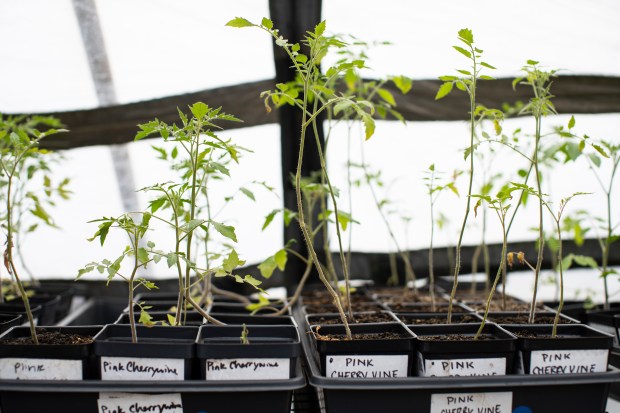
Zeni is helping preserve another family story thanks to an encounter with an older guy he met at one of his pop-up sales at the Percolator Coffee Shop in Portage Park. He showed Zeni some seeds and said, “My father-in-law brought these over from Calabria and has been growing them ever since. He passed away and we continued to save these seeds, and I want to give them to you.”
Zeni asked the man, who came out from River Grove, what the tomatoes were called.
“I don’t know,” was the response. “It’s always just been my father-in-law’s tomato. My family has been growing them for 100 years. I’ve been growing them in my backyard.”
The man’s name was Art Zaino, “so that’s what we called them,” Zeni said. “These are big tomatoes. They’re like 16-inch softball sized tomatoes.”
While the Inciardi tomato has become somewhat more well-known among heirloom aficionados, the Art Zaino is “something that’s exclusive to us,” Zeni said. “I don’t think he gave the seeds to anyone else.”
For Zeni, heirloom tomatoes offer not only the opportunity to share the stories of fellow nightshade aficionados past and present, but also some of the places where he sells seedlings as well.
He’s already kicked off the gardening season with popup sales around the city and suburbs, including Pollyanna Brewing in Lemont, and has more coming up. There’s one from 10 a.m. to noon on May 31 at Two-Mile Coffee Bar, 9907 S. Walden Parkway, near the Metra stop in Chicago’s Beverly community; and another from 1 to 3 p.m. on May 31 at the Hyde Park Neighborhood Club, 5480 S. Kenwood Ave. in Chicago.
He’ll be at Skokie’s Sketchbook Brewing, 4901 Main St., on May 25. Other Pollyanna locations will be on June 7 in Roselle and later that day in St. Charles.
Also on the schedule is the last of four pop-ups on May 24 at First Presbyterian Church of La Grange, 150 S. Ashland Ave. A full list as well as ordering information is on his website at chicagotomatoman.com.
“These are locally owned places that let us set up, and in exchange we try to recognize and promote them, encourage people to buy a croissant and a coffee, or a four-pack or growler of beer,” Zeni said. “It’s about creating community and helping community, so we all prosper and thrive.”
But his primary goal remains to spread his love of tomatoes.
“I understand why the food industry has done what they’ve done to tomatoes,” he said. “Everyone wants to buy tomatoes in January at the grocery store, so they’ve bred them so they’re durable, they look great and they’re all the same size. But the flavor is gone and I think it’s criminal.
“A real tomato is something everyone should experience. The flavor is so wonderful. It’s so gratifying when someone picks those first few off the vine and realize the experience was worth all the time and effort put in to grow them.”
Landmarks is a column by Paul Eisenberg exploring the people, places and things that have left an indelible mark on the region. He can be reached at peisenberg@tribpub.com.


